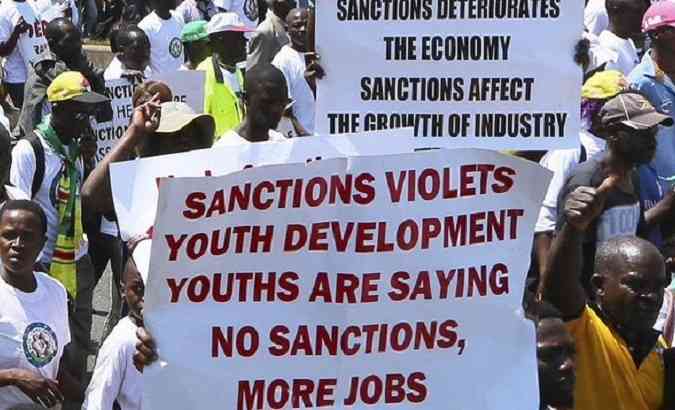
Zimbabwean businesses are encouraged to explore cooperation opportunities with global partners following the termination of broader US sanctions on the southern African country.
The call was made by Zimbabwean Foreign Affairs and International Trade minister Frederick Shava at the opening of the Zimbabwe-US Business Forum in the capital, Harare, on Monday.
A nine-member delegation from the Global Opportunities Committee of the Atlanta Black Chambers (ABC), a non-profit organization based in Atlanta, the United States, is currently in Zimbabwe to explore investment opportunities in the country. This trade and investment mission, the first since the US administration terminated its sanctions program on Zimbabwe last week, is part of a regional tour that includes South Africa and Zambia.
Shava highlighted the significant benefits expected to accrue to the country through the trade and investment mission, including the opportunity to leverage ABC’s experience to change the narrative about Zimbabwe as an investment destination for American businesses.
“Let’s take full advantage of the newly stated United States government position that American businesses are free to engage Zimbabwean business entities,” Shava said.
U.S. President Joe Biden terminated a sanctions program on March 4 that had been in force since 2003. However, new sanctions were imposed on 11 individuals, including President Emmerson Mnangagwa and Vice-President Constantino Chiwenga, as well as three entities, over alleged involvement in corruption and human rights abuses.
Last Wednesday, Charge d’Affaires of the US embassy in Zimbabwe Laurence Socha told a media briefing that the new sanctions position presents an opportunity for American businesses, financial institutions, and investors to reconsider Zimbabwe’s markets.
According to a statement issued by the Zimbabwean Ministry of Foreign Affairs and International Trade last week, the ABC delegation is expected to meet several key industry leaders as they explore investment opportunities in real estate, manufacturing and supply, insurance, ICT, renewable energy, mining, and trade and investment sectors.
- Mavhunga puts DeMbare into Chibuku quarterfinals
- Bulls to charge into Zimbabwe gold stocks
- Ndiraya concerned as goals dry up
- Letters: How solar power is transforming African farms
Keep Reading
During the business forum on Monday, Shava said Zimbabwe is keen to strengthen and broaden its export market to the United States, particularly given the current low levels of trade between the two countries. Despite the sanctions, Zimbabwe saw its exports to the United States increase from US$700 000 in 2020 to US$12.1 million in 2022.
“Despite this significant increase, our exports remain very low and undiversified, failing to reflect the potential of both economies,” Shava said.
However, Obert Mpofu, secretary-general of the ruling Zanu PF party of Zimbabwe, suggested that the revision of sanctions appeared to be an attempt to resume business with Zimbabwe. In an opinion piece published in the Sunday Mail newspaper, Mpofu emphasized Zimbabwe’s strategic importance, not only to US interests but also to the rest of the world, due to its abundant mineral resources such as gold, lithium, natural gas, platinum, and diamonds.
Mpofu questioned whether Washington’s change in stance could be linked to the discovery of new gas and oil deposits in Zimbabwe, prompting the Americans to reassess their relationship with Zimbabwe. He pointed out the United States’ history of pursuing oil resources, suggesting that this could be a factor in their current actions.
In response to the US accusations of corruption and human rights abuses, Zimbabwean ambassador to the United States Tadeous Chifamba criticized Biden, saying that the US leader was addressing corruption allegations at a time when he and his son were facing similar accusations back home.
Chifamba also highlighted what he perceived as hypocrisy in Biden’s stance on human rights abuses, pointing out that the United States provides arms and funding for the Israeli military offensive in Gaza and conducts indiscriminate bombing in Yemen.
He emphasized that human rights abuses by the United States are well-documented, including disparities in rights between racial groups within the country.
“Even in the United States, blacks and other minority groups have fewer rights than whites. There is absolutely no justification for the continuation of these unilateral sanctions on Zimbabwe,” he said.- Xinhua







